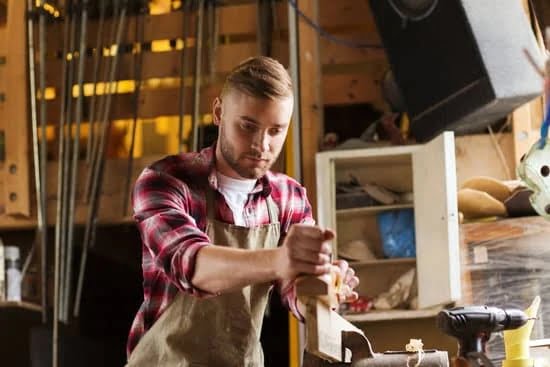What does cooper mean in woodworking? Coopering is a traditional woodworking method that involves crafting barrels, casks, and other wooden containers. The term “cooper” refers to a skilled craftsman who specializes in making these items using specific techniques and tools. In this article, we will explore the history, techniques, and modern applications of coopering in the woodworking industry.
The craft of coopering has a rich history dating back centuries, playing a vital role in industries such as brewing, winemaking, and transportation. The art of creating watertight barrels and containers was essential for preserving and transporting goods, making coopers highly sought after craftsmen in the past.
Traditional coopers are known for their expertise in using hand tools such as adzes, hammers, and shaping planes to craft wooden staves and assemble them into tight-fitting barrels. Their intricate knowledge of wood grain patterns and joinery techniques allows them to create durable containers that can withstand the test of time.
As we delve into the world of coopering, we will also examine its significance in barrel-making and other woodworking projects. Additionally, we will explore how modern applications have evolved to adapt to new technologies while still honoring the traditions of this timeless craft. Join us as we uncover the enduring legacy of coopering in woodworking traditions and practices.
The History of Cooperage and Its Importance in Woodworking
The term “cooper” in woodworking refers to a skilled craftsman who specializes in making and repairing wooden barrels, casks, buckets, tubs, and other similar items. Coopering is not only a specialized trade but also has deep historical roots that have had a significant impact on the woodworking industry.
Historical Significance
The art of cooperage dates back to ancient times and has played a vital role in various civilizations. The importance of cooperage in woodworking can be seen in its early utilization for storing and transporting essential goods such as water, wine, oil, and grain. The craft of coopering was essential for the preservation of these perishable goods during long journeys and storage.
Development of Techniques
Cooperage evolved over time, with coopers developing innovative techniques to construct watertight containers using wooden staves and hoops. The craftsmanship involved in creating these vessels required precise measurements, joinery skills, and an understanding of wood properties.
Impact on Trade and Economy
The significance of cooperage in woodworking extends beyond the craft itself. The ability to store and transport goods securely had a profound effect on trade and commerce throughout history. This further emphasizes the importance of coopers in facilitating economic exchange through their skillful woodworking techniques.
The history of cooperage highlights its importance as both a traditional woodworking practice and as a vital component in the development of various industries. Understanding this historical context provides insight into what does cooper mean in woodworking and the enduring legacy of this craft.
The Role of a Cooper in Traditional Woodworking
History and Importance
Cooperage has a rich history dating back to ancient civilizations, where wooden containers were essential for storing and transporting valuable commodities. The craftsmanship of coopers was crucial in ensuring the quality and durability of these containers. In medieval Europe, coopering flourished as trade and commerce expanded, creating a high demand for barrels to store goods for long-distance trade. The expertise of coopers was highly valued during this period, and their craftsmanship was passed down through generations.
Techniques and Tools
Traditional coopering involves a set of specialized techniques and tools that have been refined over centuries. Coopers utilize hand tools such as adzes, axes, planes, and chisels to shape wooden staves into curved forms that fit together perfectly to create watertight barrels.
The art of coopering also requires expertise in working with different wood species, understanding grain patterns, and joining techniques such as doweling or metal hoops to secure the container’s structure. What does cooper mean in woodworking extends beyond just creating barrels but also encompasses the mastery of these intricate woodworking skills.
The craftsmanship of coopers continues to hold great significance today, both as a respected tradition and as a source of inspiration for modern woodworking practices.оловец.
Techniques and Tools Used by Coopers in Woodworking
Coopering is the art of creating wooden casks, barrels, and other storage containers. Coopers use a variety of tools and techniques to create these items. The main tool used by coopers is the cooper’s axe, which is used to shape and hollow out the staves of the barrel. Additionally, coopers also use a variety of hand tools such as adzes, planes, and chisels to shape and smooth the wood.
One of the key techniques used by coopers is known as “raising,” which involves shaping individual wooden staves into curved shapes that will form the body of the barrel or cask. This process requires precision and skill to ensure that each stave fits together perfectly to create a watertight container. Another important technique used by coopers is known as “hooping,” which involves fitting metal hoops around the exterior of the barrel to hold the staves in place.
The combination of traditional techniques and specialized tools allows coopers to create high-quality wooden containers that are not only functional but also visually appealing. While modern woodworking has seen an increase in the use of machinery and mass production methods, many coopers continue to use these traditional techniques and tools to create handmade barrels and casks that are in high demand for their craftsmanship and quality.
| Term | Description |
|---|---|
| Cooper’s Axe | Main tool used by coopers to shape and hollow out barrel staves |
| Adzes, planes, and chisels | Hand tools used to shape and smooth wood in coopering |
| Raising | Technique used to shape individual staves into curved shapes for barrels |
The Significance of Coopering in Barrel-Making and Other Woodworking Projects
Coopering has a significant role in barrel-making and other woodworking projects. The term “cooper” refers to a skilled craftsman who specializes in making and repairing barrels, casks, buckets, tubs, vats, and other similar wooden objects. These products are commonly used for storing and transporting liquids such as water, wine, oil, and spirits.
The art of cooperage dates back to ancient times and has played a crucial role in various industries such as brewing, winemaking, distilling, and food preservation. Coopers were highly esteemed for their craftsmanship and their ability to create watertight containers without the use of adhesives or modern sealants.
In traditional coopering, coopers utilized a variety of techniques and tools to fashion wooden staves into barrels. This process involved shaping the staves with precision to ensure they fit together snugly without any gaps. Coopers also employed hoops made from metal or wood to hold the staves in place and maintain the structural integrity of the barrel. The craftsmanship required in creating these functional yet beautiful vessels illustrates what does cooper mean in woodworking.
- Traditional techniques included heating the wood to make it pliable enough for bending.
- Specialized tools such as adzes, axes, planes, chisels, and mallets were used by coopers to shape the wood.
- Meticulous attention to detail was essential in ensuring that the barrels were durable and leak-proof.
Coopering continues to be an important aspect of woodworking today. While modern technology has introduced alternative materials for container construction, wooden barrels crafted by skilled coopers are still highly sought after for aging fine wines and spirits. Additionally, there is a renewed interest in traditional coopering techniques for artisanal woodworking projects.
- In recent years, coopers have adapted their skills to meet the demands of contemporary consumers by creating custom-made wooden vessels for home decor items such as planter boxes or decorative tubs.
- Furthermore, coopers are also exploring sustainable practices by using reclaimed wood and environmentally friendly finishes for their woodworking projects.
The significance of coopering in barrel-making extends beyond its functional use; it symbolizes the melding of artistic expression with practical craftsmanship within the realm of woodworking.
Modern Applications of Coopering in the Woodworking Industry
Coopering, though traditionally associated with barrel-making, has found modern applications beyond its historical roots. In today’s woodworking industry, coopers are sought after for their expertise in crafting not only barrels but also a wide range of wooden vessels and containers. The time-honored techniques and skills of coopering have proven to be valuable in creating unique pieces that are both functional and aesthetically pleasing.
One modern application of coopering in the woodworking industry is the production of custom-made wooden casks for aging spirits such as whiskey, rum, and wine. These specialty casks are highly sought after by distilleries and wineries looking to enhance the flavor profile of their products through traditional aging processes.
Coopers play a crucial role in crafting these casks, utilizing their knowledge of wood selection, shaping, and assembly to create containers that can impart distinct flavors to the beverages they hold.
Another noteworthy application of coopering in modern woodworking is the construction of bespoke wooden tubs and buckets. These handcrafted pieces are favored by homeowners and businesses seeking to add a touch of rustic charm to their spaces. Coopers employ their artisanal skills to fashion tubs and buckets that showcase the natural beauty of wood while serving practical functions for bathing, laundry, or decorative storage.
The artistry and craftsmanship exhibited by coopers in the modern woodworking industry have resulted in a resurgence of interest in traditional wooden containers and vessels. Their ability to blend age-old techniques with contemporary design sensibilities has positioned coopering as a relevant and thriving aspect of woodworking today.
Famous Coopers and Their Contributions to Woodworking
Throughout history, there have been many notable coopers who have made significant contributions to the woodworking industry. One such figure is John Adan, a renowned cooper from the 18th century known for his exceptional craftsmanship in barrel-making. Adan’s innovative use of stave jointing techniques revolutionized the field of coopering and set new standards for quality and precision in woodworking.
Another prominent figure in the world of cooperage is Sarah Thompson, one of the first female coopers to gain widespread recognition for her work in the 19th century. Thompson’s expertise in shaping and forming wooden barrels helped pave the way for greater gender diversity in traditionally male-dominated woodworking professions. Her legacy continues to inspire aspiring coopers, regardless of gender, to this day.
In the modern era, there are countless coopers who have achieved acclaim for their mastery of traditional woodworking practices. One such contemporary figure is David Smith, a master cooper known for his dedication to preserving age-old coopering techniques in an increasingly mechanized industry. Smith’s unwavering commitment to craftsmanship serves as a reminder of the enduring significance of coopering in woodworking traditions.
| Famous Cooper | Contribution to Woodworking |
|---|---|
| John Adan | Revolutionized stave jointing techniques in barrel-making |
| Sarah Thompson | Pioneered gender diversity in traditionally male-dominated professions |
| David Smith | Dedicated to preserving age-old coopering techniques in a modern industry |
Conclusion
Throughout history, the term “cooper” has held a significant role in woodworking, particularly in the crafting of barrels and other wooden vessels. From its origins as a crucial trade in the transportation and storage of goods to its modern-day applications in artisanal woodworking, cooperage continues to be an integral part of the woodworking industry. The enduring legacy of coopering speaks to the craftsmanship, skill, and artistry that coopers bring to their work.
The practice of coopering has deep historical roots, with evidence of cooperage dating back thousands of years. The importance of barrels and wooden containers in early civilizations paved the way for the development of specialized techniques and tools used by coopers. Their ability to fashion staves, create watertight joints, and shape wood into functional vessels revolutionized industries such as shipping, brewing, and food preservation.
In modern times, coopering continues to thrive as artisans and craftsmen honor traditional techniques while also embracing innovative approaches. The resurgence of interest in handcrafted goods has sparked a renewed appreciation for coopering, leading to a renaissance in the woodworking industry. As we look to the future, it is undeniable that the enduring legacy of coopering will continue to inspire new generations of woodworkers and craftsmen who seek to carry on this time-honored tradition.
Frequently Asked Questions
What Is a Cooper in Woodworking?
A cooper in woodworking is a skilled craftsman who specializes in making and repairing barrels, casks, tubs, and other wooden containers. They are responsible for carefully shaping staves (narrow lengths of wood) and assembling them using hoops to create a watertight vessel.
Why Is a Barrel Maker Called a Cooper?
A barrel maker is called a cooper because the term “cooper” originates from the Middle Dutch word “kuiper,” which means “tub” or “container.” Over time, this term came to refer to the craftsmen who were skilled in creating these wooden vessels.
The craft of coopering has been around for centuries and was essential for industries such as shipping, food storage, and alcohol production.
What Is an Oak Cooper?
An oak cooper is a specialized type of cooper who specifically works with oak wood to create barrels and casks. Oak has long been prized for its durability, strength, and ability to impart desirable flavors to aging beverages such as wine and whiskey.
Oak coopers must have a deep understanding of working with this particular type of wood to produce high-quality containers for aging and storing various liquids.

Hi everyone! I’m a woodworker and blogger, and this is my woodworking blog. In my blog, I share tips and tricks for woodworkers of all skill levels, as well as project ideas that you can try yourself.



